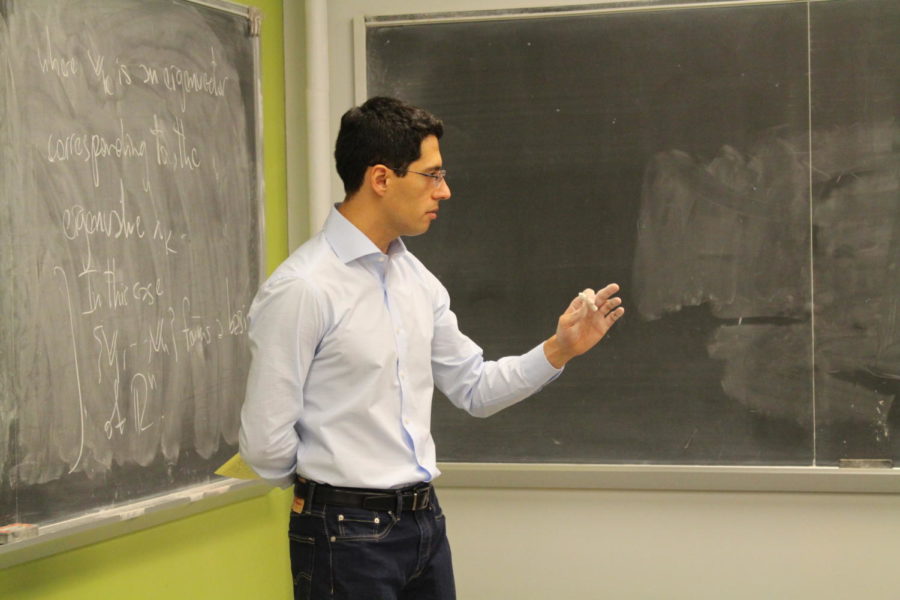Assistant professor earns mathematics honors
October 25, 2018
From Argentina to Iowa, an Iowa State mathematics professor has continued his passion as both a teacher and a mentor for students at Iowa State.
Pablo Raúl Stinga, an assistant mathematics professor at Iowa State, was recently recognized for his work by Lathisms, a publication founded in 2016, that is dedicated recognizing prominent mathematicians in the Latinx community.
Stinga grew up in Argentina and continued to live and study in there, obtaining a degree in mathematics from Universidad Nacional de San Luis.
From his time in high school in Argentina, Stinga said he enjoyed teaching mathematics, and he recalled teaching concepts to his classmates.
Understanding has always been an important part of Stinga’s teaching style. He said beginning in high school, he taught students based on his own understanding of a given concept. He said this helped students to understand why a concept functioned as it did. Stinga said he continues this concept in his teaching today.
“I try to get people to think, because if you think in a logical way, it’s not just in mathematics, you can apply that to your life,” Stinga said.
Stinga originally went to college with the goal of getting a degree so that he could teach high school mathematics but quickly refocused his goals after his first year at college.
After his first year at college, Stinga said his calculus class brought him to realize a whole new world of math he had not previously discovered.
Following this discovery after his graduation, Stinga decided to pursue a doctorate in mathematics. He decided to attend a school in Spain, but still retained his interest in teaching.
Stinga said he enjoyed his time in Spain, and that he was not homesick despite being far from home. He said he was able to return home at least once per year and stay in contact with family while exploring new things.
“Going to Spain I was like, ‘Okay this is a new adventure,’ you get to know so many new things and new people,” Stinga said. “You always find good people wherever you go, and every place has its wonderful things to discover.”
After spending two years researching and teaching in Spain, Stinga continued to pursue travel and discovery and he took his first position as a faculty member at UT Austin.
Stinga said he was excited to work under Luis Caffarelli, someone who Stinga looked up to as a mathematician and a person. But he also said teaching in America was a big change from his time in Spain and Argentina.
“I had to teach in English, and speak continuously in English to a class of one hundred and twenty,” Stinga said.
Teaching in English was not the only challenge Stinga faced when adjusting to life in Austin, as life in the United States continued to present changes outside of his career.
“In Spain and Argentina, you essentially walk everywhere, so when I came here, I didn’t realize I had to buy a car immediately,” Stinga said. “So I was, for a little bit more than a year, taking the bus and walking, and then I finally bought a car.”
Stinga said things like going to the doctor used to take hours, and after purchasing a car it would only take 15 minutes, and that how he didn’t realize how necessary owning a car was in America until he finally had one.
While Stinga initially had some challenges in transitioning to life in Austin, he said he took a similar approach as he did to his time in Spain through exploration and discovery. Eventually, Stinga said he settled in.
While at UT, Stinga enjoyed their motto of always putting the students, and the experience of students first. Stinga said this emphasis on the student experience stuck with him and has continued to influence his teaching style, even now at Iowa State.
Stinga said he most enjoys being able to connect with and help his students on a more personal level, even outside of the classroom.
Taking this passion, as well as applying the motto of always making sure the students have the best environment to succeed, Stinga said he immediately accepted the opportunity to be a founding faculty member of Lazos at Iowa State.
Lazos is a group of Latino professors and students at Iowa State who hold monthly dinners and give Latino students as a chance to talk to and form relationships with their professors, as well as foster and create stronger community and relationships with their fellow classmates.
“The part that I like the most is when they are able to succeed,” Stinga said. “We’re all going to have struggles, so the highlight is when you see them that, thanks to a little thing you told them, they went further.”
Through Lazos, Stinga recalled being able to help a student who had a very rude boss at his job, and worked a shift from 2 a.m. to 6 a.m. Stinga and other members of Lazos were able to help the student get a better shift and have better hours that allowed him to sleep at night.
Stinga said he enjoys the community aspects of Lazos and being able to interact with the other Latino students and professors on campus, saying that it is very beneficial for him.
“The point is to make friends and have a support system which is very positive for [students], but also for me,” Stinga said.
Stinga said he has found himself missing Lazos meetings, as he is inspired by the energy of the students he gets to spend time with, and enjoys being able to connect with students not only as a professor, but as a mentor.







